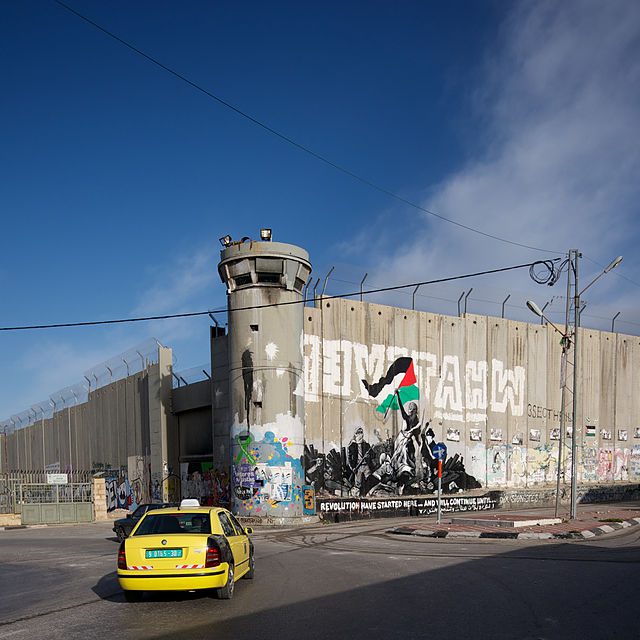
(Wikimedia Commons public domain.)
Another selection from The Manuscript:
The sense of loss among Arabs was powerful and profound. A poem by Abdul Wahab al-Bayati, “The Arab Refugee,” gives voice to this. Notice its lament over the lost Arab town of Jaffa, whose orange groves, now in Jewish hands, supply Europe with a substantial proportion of its fruit in the winter. Notice, too, the memory of Arab greatness symbolized by the illustrious anti-Crusader hero, Saladin. This memory is only the more painful because, betrayed and sold by Saladin’s corrupt and unworthy successors, it lies so far in the past. I quote a part of the poem:
Ants gnaw his flesh
Crows peck his flesh
The Arab refugee nailed to the cross.
The Arab refugee
Begs and spends his nights in railway stations Crying his eyes out.
And Jaffa is just a small label
On a box of oranges.
Stop knocking on my door
There’s no life left in me.
And Jaffa is just an orange label It leaves the dead undisturbed.
They’ve sold the memory of Saladin They’ve sold his horse and shield They’ve sold the grave of refugees…
Ants gnaw his flesh
Crows peck his flesh
The Arab refugee begging at your door.[1]
Al-Bayati, from Iraq, writes with bitter anger about the sheer humiliation of continuing Arab powerlessness before Israel. Jabra Ibrahim Jabra, on the other hand, is a Palestinian, born at Bethlehem, and his poignant poem about exile is much more gentle than al-Bayati’s. Indeed, it seems reminiscent of Jewish yearnings for that same small plot of land, expressed through the centuries of their own diaspora, or dispersion from their home. With their wanderings in the desert, portrayed in Jabra’s poem, the Palestinians are made to seem a modern equivalent of the children of Israel. “Where,” he implicitly asks, “is their Moses?”
Spring after spring, In the deserts of exile,
What are we doing with our love,
When our eyes are full of frost and dust?
Our Palestine, green land of ours;
Its flowers as if embroidered of women’s gowns;[2]
March adorns its hills
With the jewel-like peony and narcissus;
April bursts open in its plains
With flowers and bride-like blossoms;
May is our rustic song
Which we sing at noon,
In the blue shadows,
Among the olive-trees of our valleys,
And in the ripeness of the fields
We wait for the promise of July
And the joyous dance amidst the harvest.
O land of ours where our childhood passed
Like dreams in the shade of the orange-grove,[3]
Among the almond-trees in the valleys— Remember us now wandering
Among the thorns of the desert, Wandering in rocky mountains; Remember us now
In the tumult of cities beyond deserts and seas; Remember us
With our eyes full of dust
That never clears in our ceaseless wandering. They crushed the flowers on the hills around us, Destroyed the houses over our heads,
Scattered our torn remains,
Then unfolded the desert before us, With valleys writhing in hunger
And blue shadows shattered into red thorns
Bent over corpses left as prey for falcon and crow.
Is it from your hills that the angels sang to the shepherds Of peace on earth and goodwill among men?
Only death laughed when it saw
Among the entrails of beasts
The ribs of men,
And through the guffaw of bullets
It went dancing a joyous dance
On the heads of weeping women.
Our land is an emerald,
But in the deserts of exile,
Spring after spring,
Only the dust hisses in our face.
What then, what are we doing with our love?
When our eyes and our mouth are full of frost and dust?[4]
[1] Translated by Abdullah al-Udhari, in his collection Modern Poetry of the Arab World (New York Viking Penguin, 1986), 36-37.
[2] Traditional women’s dresses in Palestine are well known for their embroidery.
[3] Again, the nostalgic yearning for the orange groves seized by the Israelis.
[4] This is Jabra’s own translation of his poem “In the Deserts of Exile,” appearing in Khouri and Algar, An Anthology of Modern Arabic Poetry, 225-29.
Posted from Jericho, Palestine











